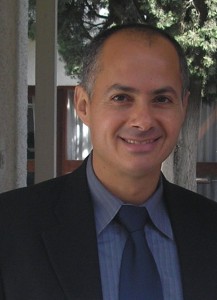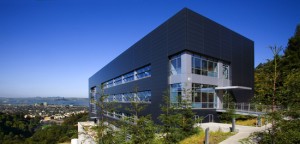Omar Yaghi to Direct Berkeley Lab’s Molecular Foundry

Omar Yaghi, 46, one of the world’s most cited chemists whose inventions include metal organic frameworks (MOFs), the crystalline storage vessels touted for their capacity to capture and contain carbon dioxide and other gases, and reticular chemistry, the technique for stitching together individual molecules into predetermined structures, has been named the new director of the Molecular Foundry at the Lawrence Berkeley National Laboratory (Berkeley Lab). His appointment was effective January 3, 2012. The Molecular Foundry is a U.S. Department of Energy (DOE) nanoscience research center.
“We are pleased and proud that a chemist of Omar Yaghi’s eminence has agreed to serve as the new director of the Molecular Foundry,” said Berkeley Lab director Paul Alivisatos. “His accomplishments in the design and synthesis of metal organic frameworks has opened new directions in materials chemistry and created enormous opportunities for advances in energy technology areas like carbon dioxide capture. Omar is one of the leading nano scientists in the world today, and also has a strong vision for how to foster science cooperation and build science globally. I am thrilled that he has joined us to lead the Molecular Foundry. I’d also like to recognize and thank Jim De Yoreo for his splendid service as interim director of the Foundry.”
Yaghi, who will also hold an appointment with the University of California (UC) Berkeley chemistry department, comes to Berkeley from UCLA, where he was the Jean Stone Professor of Chemistry and Biochemistry and Professor of Molecular and Medical Pharmacology, among other positions.
”The Molecular Foundry is uniquely positioned to address some of the most pressing challenges in the important field of nanoscience because of its relevance to many areas, not the least of which are energy and environment,” Yaghi said. “This is because of the dedicated and brilliant researchers with whom I shall have the pleasure and honor to work side-by-side. Indeed, very few places around the world combine so many brilliant researchers and state-of-the-art facilities in one spot. The Molecular Foundry represents how I have always imagined science should be organized and carried out. I am fortunate to take part of what was originally a great idea and then became an experiment. Within a short period of time we can already see how that experiment is working out beautifully.”
Born in Amman, Jordan, Yaghi received his B.S. in chemistry from the State University of New York-Albany in 1985, and his Ph.D. from the University of Illinois-Urbana in 1990. Following two years as an NSF Postdoctoral Fellow at Harvard University, he joined the faculty at Arizona State University. Seven years later he became a professor of chemistry at the University of Michigan. He joined the UCLA faculty in 2005 where he would become the director of the Center for Reticular Chemistry at the California NanoSystems Institute.

This past year, the Thomson Reuters organization, which rates scientists based on the impact of their published research, ranked Yaghi the number two chemist in the world out of a pool of more than 6,000. In the first ten years of this century, he was credited with 90 published scientific papers that were cited 19,670 times by other scientists — for an “impact score,” or average, of roughly 221 citations per paper. Other recognitions include the Solid State Chemistry Award of the American Chemical Society (ACS)and Exxon, the Sacconi Medal of the Italian Chemical Society, DOE’s Hydrogen Program Award, the Materials Research Society Medal, the AAAS Newcomb Cleveland Prize for the best paper published in Science, and the ACS’ Chemistry of Materials Award. In 2006, he was named one of the Popular Science Magazine’s “Brilliant 10” for his work on hydrogen storage.
Yaghi is perhaps most famous for his invention of entire new classes of materials, which in addition to MOFs also include zeolitic imidazolate frameworks (ZIFs) and covalent organic frameworks (COFs). These materials make it possible to store vast quantities of natural gas, hydrogen or carbon dioxide in confined spaces. The reticular chemistry technique he developed makes it possible to synthesize extended structures from purely organic, inorganic and metal-organic building blocks. His research holds high promise for a wide range of technologies including clean energy, catalysis, and gas storage and separation.
